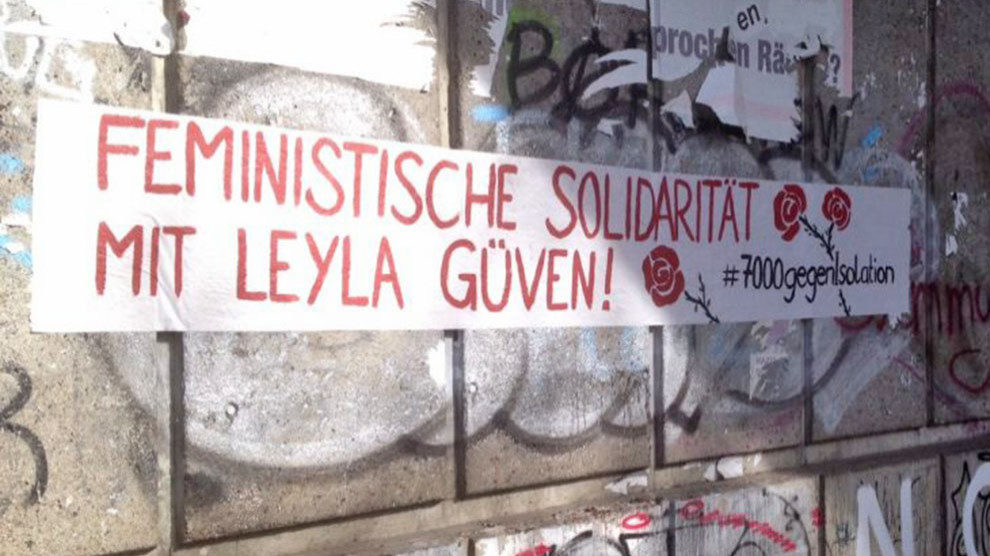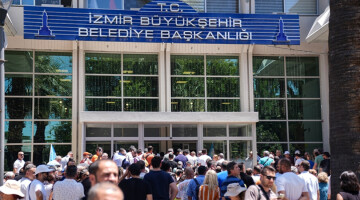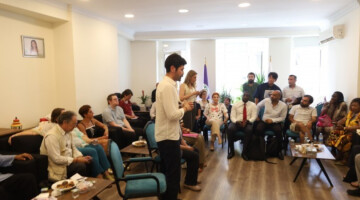The feminist campaign "Gemeinsam Kämpfen" ("Fighting together for self-determination and democratic autonomy") released a statement on the end of the hunger strike in Turkey.
Full text of the statement by Gemeinsam Kämpfen reads as follows;
"7000 political prisoners and revolutionaries in the prisons of Turkey were on an unlimited hunger strike for up to 200 days, 30 revolutionaries were on a death fast. In addition, dozens of Kurdish activists in various European countries and worldwide took part in the hunger strike and shared the demand for an end to Öcalan's isolation conditions," writes the feminist campaign "Fighting Together for Self-determination and Democratic Autonomy" to end the hunger strike. It continues in its statement:
Now they have finally had success, their action has led to mobilizing people worldwide, the demand for an end to isolation has been pushed through!
In a statement by Abdullah Öcalan of 22 May 2019 from Imrali Prison, transmitted by his lawyers, it says:
“Dear comrades,
In light of the wide-ranging statements my two lawyers will be making, I expect the protests, especially of the comrades who have committed themselves to hunger strikes and death fasts, to come to an end. I would like to express that your intentions with regards to me have been realized and I present to all of you my deepest affections and gratitude. In fact, after this point, I diligently hope and expect you to accompany me with adequate intensity and will power."
Leyla Güven explained: "I will end the hunger strike, but our resistance against isolation and our struggle for social peace will continue. We want a dignified peace". We congratulate the hunger strikers on this hard-won victory. We are aware that this fight was a very hard fight and we are deeply connected with Leyla Güven and all other hunger strikers, as well as with the nine martyrs of this one.
I expressly hope that from now on you will accompany me with the necessary intensity and the necessary will".
Leyla Güven explained: "I will end the hunger strike, but our resistance against isolation and our struggle for social peace will continue. We want a dignified peace".
We congratulate the hunger strikers on this hard-won victory. We are aware that this fight was a very hard fight and we are deeply connected with Leyla Güven and all other hunger strikers, as well as with the nine fallen of this struggle: Ümit Acar, Zülküf Gezen, Uğur Șakar, Ayten Becet, Zehra Sağlam, Medya Çınar, Yonca Akıncı, Siraç Yüksek and Mazlum Pumay.
Meeting the demands of the hunger strikers means acting in accordance with the human rights enshrined in law. This should have been self-evident. But the bitter reality of the last six months has been silence and inaction. To ignore the urgent demand of the hunger strikers calls human rights into question: in Turkey, in the EU, in those states like Germany that cooperate closely with Turkey, etc., but also in the EU.
But there is much more at stake: a success of the hunger strike with the lifting of the isolation of Abdullah Öcalan could be the beginning of a new peace process. We see the isolation of Abdullah Öcalan as an attempt to silence the ideas and proposals of a new, alternative and free form of society and ultimately to destroy them.
What does the hunger strike have to do with peace/negotiations?
On the one hand we have to look at the prehistory. In the peace negotiations between the Kurdish movement and the Turkish state, which took place from 2013 to 2015, Abdullah Ocalan as representative of the Kurds and many progressive forces in the Middle East was the negotiator despite his imprisonment since 1999. In prison, he had drafted a roadmap for the peace process, which was published in 2009 as a "Roadmap for Negotiations". At the beginning of 2013, it was also a hunger strike by the political prisoners which, after a phase of increased warfare, brought about the beginning of the peace talks between Öcalan, a political delegation of the Turkish government and representatives of the HDP. In April 2015, Turkish President Erdoğan ended these talks.
This was followed by a period of unprecedented state power against the Kurdish and resistant population in Turkey, which increased up to the war of annihilation against Kurdish cities, Kurdish identity and social self-administration. Dozens of civilians were murdered.
At the beginning of 2018, the Turkish military invaded the democratically self-governing northern Syrian canton of Afrîn and occupied it together with Islamist militias. Turkish military bases were also installed in Kurdish northern Iraq (Başur). Erdoğans AKP, together with the extreme right-wing MHP, transformed Turkey into a presidential system with a constitutional referendum, democratic rights were massively dismantled and a development towards fascist rule was driven in.
The AKP's policy is directed against the self-organization of feminist forces. Women's centres have been closed, Erdoğan speaks against equality for women and describes abortion as murder, women are being forced into the domestic sphere and the mother role, violence against women and feminicide are on the increase. LGBTI activities are massively restricted, made impossible. Since the state of emergency of 2017-18, only people loyal to the government have been able to continue working in the state administration, the judiciary, education, culture and the media. Around 50,000 people - including many members of parliament and human rights activists- are currently imprisoned for political reasons.
On the other hand, the declarations of the hunger strikers made it clear that the implementation of a peace solution was the core motivation and objective of this action.
Leyla Güven, who started the hunger strike action on 8 November 2018, is the most prominent. With this initiative she started an action of thousands. Leyla Güven was imprisoned in Afrîn for her struggle for peace and her clear stance against the war of aggression. With the beginning of the hunger strike, she broke with her strong will the supposed impotence of her imprisonment and took another form of resistance and struggle for peace. With this form of action, Leyla Güven connects herself with the significant hunger strikes in 1982 and 2013. [1]
Leyla Güven is not only a member of parliament of the HDP, she is also chairwoman of the civil society association "Democratic People's Congress" (DTK). The DTK is organised according to the idea of Democratic Confederalism on the basis of local councils, elected local councils and civil society organisations. It exists parallel and overlapping to the state structure. During the peace process 2013-15, the AKP held talks with the DTK. The peaceful coexistence of the various population groups and democratisation in Turkey are among the founding concerns of the DTK: "Democratic autonomy will not change the borders. It will reinforce the brotherhood of peoples and their unity within the borders, which will end conflicts; the Kurdish people and Turkey will reach a new contract and launch a new era in Turkish-Kurdish relations. Our model is a democratisation model that can be applied to all other parts of Turkey." (DTK 2011).
Leyla Güven now expressed this concern for peaceful, democratizing conflict resolution with the hunger strike. She wrote in a letter "The isolation of Abdullah Öcalan prevents a sustainable social peace. Abdullah Öcalan is an important actor in building social peace. He has proven this with theoretical and practical experience. Society is aware of this". (January 2019)
In May 2019, Abdullah Öcalan was permitted to be visited by his lawyers for the first time in eight years. A first success of the hunger strike. During this visit, Öcalan handed over a letter from the four prisoners on Imrali Prison Island, which also focuses on the idea of peace. They express their determination to build on the Ocalan Newroz Declaration of 2013. At the time of the peace process, he had said: "At last a new era is beginning, not arms, but democratic politics will be at the forefront". The call of 2013 was addressed to all population groups in Turkey and formulated the desire for a common future of fraternal coexistence in freedom and equality.
"I call upon all representatives of the oppressed peoples, classes and cultures, the women as the oldest colony and oppressed class, the members of oppressed denominations, faiths and other cultural groups, the representatives of the working class and all those excluded from the system: The system of Democratic Modernity is the new option of the way out of oppression. Take your place in it and appropriate its mentality and form." (2013)
In the Imrali Declaration of May 2019, Öcalan and the three other prisoners advocate the method of democratic negotiation as a solution to the problems in this historical phase. They refer both to the situation within Turkey and to the situation in (Northeast) Syria and the entire region. The Democratic Forces of Syria (QSD) could "renounce the culture of conflict in order to solve problems in Syria and achieve a status [...] that corresponds to the principles of local democracy and constitutionally guarantees their rights on the basis of a united Syria".
During the peace talks 2013-2015 Abdullah Öcalan was still imprisoned on Imrali. There were only limited opportunities for talks. There have been no contacts since 2015. In order to be able to hold political talks again at all, it is not necessary to have individual, but rather regular and comprehensive opportunities for communication through visits, letters and telephone conversations. The hunger strikers fought for this. In order for the political talks to be turned into serious peace negotiations, it is necessary for Öcalan to be released from prison. Just as the release of Nelson Mandelas in 1990, after 27 years imprisonment and listing as a terrorist, was a key step in enabling the negotiations that led to the end of the apartheid system in South Africa.
The theory of democratic solutions for peace
Abdullah Öcalan has written a "Roadmap for Negotiations" (2009) to clarify the theoretical basis for peace talks. The focus is on the relationship between democratisation and the state. A clear distinction must be made between state-based and democratic approaches. For this it is important not to equate nation and state. A peace process must not be understood as a power negotiation with the state. Peace means building the (new) social order. The way there should not take the form of diplomatic negotiations between power actors and behind closed doors. The solution, however, can only come from society, which must be self-determined and freely organized. Often, our thinking is still dominated by state-centred solutions, so that we do not offer sufficient resistance when talks and decisions on war and peace take place under exclusion of the people concerned. We should not seek solutions in the state, which always focuses on power-sharing. The solution can only be found in and through society. In this way, the peace solution becomes a realisation of the democratic will which seeks to distance itself from power. Instead of being oriented towards the state, democratic self-organization and the democratic autonomy of the various social groups form the basis for peace in dignity as a democratic nation - in Turkey, in Syria, elsewhere. The basis from which a peace with dignity can emerge is to continue to develop democratization. Ultimately, the peace process, which should be the aim, will frame and secure the democratisation process. Society, which assumes responsibility for itself, for political decisions taken from the social basis, for fair gender relations, for an ecological way of life, will have to force the state to make room for precisely these social processes. The peace process therefore needs the communicative inclusion of all social groups. In 2013 Öcalan insisted on the participation of women in the peace talks. A DTK women's meeting set up the 'Council of Wise Women' to help advance the peace process. The coming peace process also needs comprehensive, well-secured communication opportunities. That is why the hunger strike was used to fight for communication with Abdullah Öcalan. Women's organisations around the world are working to ensure that they are not excluded from peace negotiations. Peace processes involving civil society groups, including women's organisations, fail far less frequently and last much longer. Gender-neutral societies are far less likely to use violence to resolve internal and external conflicts.
Breaking through isolation in prison and isolation in society
The core of being human is living in social relationships. Therefore, solitary confinement is considered a form of torture aimed at destroying a person. The German state is a pioneer in the development of this form of detention. We also suffer isolation outside the prisons in other forms: Individualisation, efficiency and performance pressure, competition, loneliness, consumption, profit and growth orientation, alienation from ourselves and nature attack our soul and our coexistence. To regain freedom, we must strengthen social organization and the multiple aspects of connectedness. The care and respectful responsibility for each other and for nature, as well as the collective responsibility for political decision-making, this idea guides us, together with the reappropriation of a social-ethical basis to become the center of social life.












